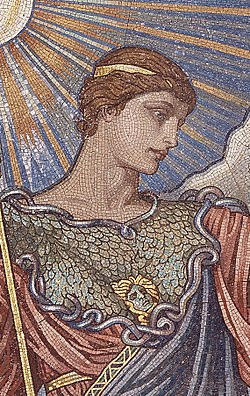 | |
| Gender | Feminine |
|---|---|
| Origin | |
| Word/name | Etruscan, Latin, Proto-Indo-European, Proto-Italic |
| Meaning | Intelligence, thought, understanding |
| Other names | |
| Nicknames | Mini, Minnie, Minou |
| Related names | Manerva, Manervia, Menerva, Menirva, Minervah, Minervia, Minervy, Minirva (American English spelling variants); Mínerva (Icelandic); Minerve (French); Minerwa (Polish) |
Minerva is a feminine given name usually given in reference to the Ancient Roman goddess of wisdom. The name Minerva stems from Proto-Italic *meneswo ("intelligent, understanding"), and ultimately from Proto-Indo-European (PIE) *menos ("thought"). [1]